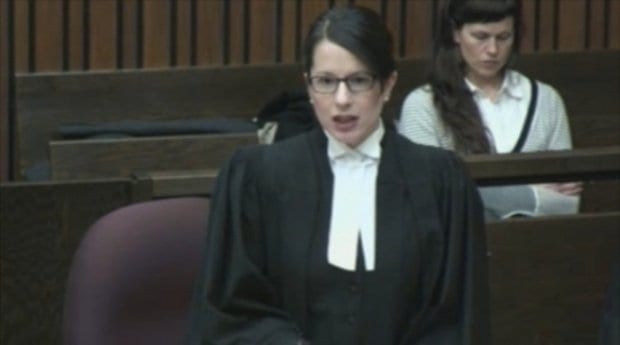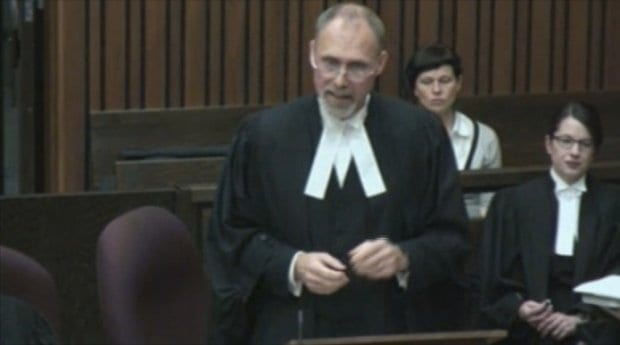
The Nova Scotia Barristers Society’s (NSBS) role is to approve articling law students, not law schools, a federal Justice Department lawyer Jessica Harris told a Nova Scotia Supreme Court judge Dec 17. Credit: Jeremy Hainsworth
The Nova Scotia Barristers Society’s (NSBS) role is to approve articling law students, not law schools, a federal Justice Department lawyer told a Nova Scotia Supreme Court judge Dec 17.
Jessica Harris was presenting arguments on the second day of a judicial review that Trinity Western University (TWU) sought against an NSBS decision to refuse to approve the BC university’s proposed law school.
In April, the NSBS’s council said TWU must drop its community covenant prohibiting same-sex intimacy before its graduates would be allowed to enroll in the province’s bar admission program. For admission to the evangelical Christian school, students must sign a covenant agreeing to uphold Christian biblical teachings, including no premarital sex and no homosexuality.
In its brief to the court, the NSBS argued that while the Charter of Rights and Freedoms protects freedom of religion and association, it does not require the society to support conduct that discriminates against others. But Harris told Justice Jamie Campbell the society’s decision was unreasonable. “It didn’t take into account actual evidence of discrimination of students who were to attend Trinity Western.”
Harris said the 2001 Supreme Court of Canada decision in Trinity Western University v British Columbia College of Teachers is the best guidance for a resolution in the case. There, the Supreme Court of Canada ruled that TWU’s teacher program graduates are entitled to hold “sexist, racist or homophobic beliefs” as long as they don’t act on them in the public school classrooms to which they might be assigned.
“The attorney general does not see any difference in the case before you,” Harris said.
Harris’s argument echoes one that TWU lawyer Brian Casey put forward Dec 16: that the issue is not whether the university discriminates against members of the LGBT community, but rather if a TWU graduate is qualified to practise law in the province. A brief from Harris to the court said Nova Scotia’s Legal Profession Act does not provide the society with statutory authority to approve law schools.
The court also heard from the Canadian Council of Christian Charities (CCCC), the Catholic Civil Rights League (CCRL), the Justice Centre for Constitutional Freedoms (JCCF), the Association for Reformed Political Action (ARPA) Canada, the Christian Legal Fellowship (CLF), the Evangelical Fellowship of Canada (EFC) and Christian Higher Education Canada (CHEC).
CCCC lawyer Barry Bussey told Campbell it is harmful to diversity in Canada for the NSBS to favour one view of marriage over another. “The barristers’ society simply doesn’t like, doesn’t agree with, Trinity Western’s position on marriage,” Bussey said. “It rejects the right of religious communities to have autonomy in their internal affairs.” He said sexuality remains an issue of misunderstanding, adding that there will be dissonance.
The 2004 same-sex marriage reference at the Supreme Court of Canada gave clergy as agents of the state the right to opt out of solemnizing marriages, and the same leeway should be given to degree-granting institutions, Bussey said. The barristers’ society decision moves the situation from “Trinity Western is not for everyone to Trinity Western is not for anyone,” he told the court.
CCRL lawyer Philip Horgan said the covenant is a personal commitment to self-discipline, love of God and loving one’s neighbour. “It is the crucial command given by Jesus Christ,” he said.
When Horgan addressed the emergence of a widespread discussion of rape culture and said that parents might want their children at a school with a commitment to certain behaviour, Campbell countered by saying some parents might not want their children to be at a school that was unwelcoming to LGBT people. “Bringing up this whole rape culture thing isn’t getting you very far,” he said.
JCCG lawyer John Carpay told Campbell the NSBS does not regulate members’ beliefs about marriage, nor does it stop them from forming associations where members might be required to abstain from sex outside marriage. “This decision is a direct assault on freedom of association,” he said of the NSBS’s refusal to accredit TWU students.
ARPA lawyer André Schutten argued that the NSBS would have to discriminate against lawyers produced by all-women law schools, gay law schools or Jewish law schools if it followed through on the same reasoning it has applied to TWU.
CLF lawyer Deina Warren said the NSBS decision creates two classes of lawyers entering the province. While a TWU articling lawyer can be refused, they could conceivably go to another province and article and then return to the province and practise, she pointed out. “Why is it contrary to the public interest to allow me to article here?” she asked. “What’s the difference between articling and practising?”
EFC and CHEC lawyer Albertos Polizogopoulos told the court the covenant is a pledge to live by Christian principles. He said it is inappropriate for anyone to proscribe behaviour and said the Supreme Court of Canada ruling “is still good law.”
“The principles that came out of the BC teachers’ case haven’t changed,” Polizogopoulos said, adding that the court ruled the covenant is not in a legal sense discriminatory. “Why are we here?” he asked. “This issue has been settled. If society has changed, the fundamental issues set out in the Charter have not.”
The NSBS is expected to present its arguments later in the week. An NSBS brief to the court said that in seeking regulatory approval, TWU had moved from the private sphere, where some discrimination may be permitted on religious grounds, to the public sphere, where different rules and obligations exist.
The case continues through Dec 19.
British Columbia’s minister of advanced education, Amrik Virk, revoked his approval of the law school Dec 11 following a reversal of the Law Society of British Columbia’s approval Oct 31. That revocation led to the end of a case brought by prospective Vancouver law student Trevor Loke against the ministry.
It remains to be seen if TWU will file suit against the BC law society and the ministry.

 Why you can trust Xtra
Why you can trust Xtra


